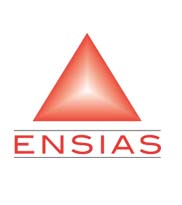- Accueil
-
L'Ecole
-
FORMATIONS
-
FORMATION INGENIEUR
-
Nouvelles filières offertes
- Ingénierie Intelligence Artificielle (2IA)
- Smart Supply Chain & Logistics (2SCL)
- Business Intelligence & Analytics (BI&A)
- Cybersécurité, Cloud et Informatique Mobile (CSCC)
- Data and Software Sciences (D2S)
- Génie de la Data (GD)
- Génie Logiciel (GL)
- Ingénierie Digitale pour la Finance (IDF)
- Smart System Engineering (SSE)
- REGLEMENT DES ETUDES DE L’ENSIAS CYCLE INGENIEUR
-
Nouvelles filières offertes
-
FORMATION INGENIEUR
- FORMATION CONTINUE
-
Recherche
- INTERNATIONAL
- ENTREPRISES
- VIE ESTUDIANTINE
- BIBLIOTHEQUE
LES DERNIÈRES INFORMATIONS
Service Function Chaining in MEC: A Mean-Field Game and Reinforcement Learning Approach
| Titre | Service Function Chaining in MEC: A Mean-Field Game and Reinforcement Learning Approach |
| Publication Type | Journal Article |
| Year of Publication | 2022 |
| Authors | Abouaomar, A, Cherkaoui, S, Mlika, Z, Kobbane, A |
| Journal | IEEE Systems Journal |
| Pagination | 1-12 |
| Mots-clés | Computation theory, Computer games, Edge computing, Game, Game theory, Learning algorithms, Network function virtualization, Problem solving, Processor scheduling, Reinforcement learning, Resource allocation, Resource allocation/provisioning, Resource Management, Resources allocation, Routings, Scheduling, Service function chaining, Service functions, Transfer functions, Virtual reality, Virtualizations |
| Abstract | Multiaccess edge computing (MEC) and network virtualization technologies are important enablers for fifth generation networks to deliver diverse services. Services are often provided as fully connected virtual network functions (VNFs), through service function chaining (SFC). However, the problem of allocating SFC resources at the edge still faces many challenges related to the way VNFs are placed, chained, and scheduled. In this article, to solve these problems, we propose a game theory-based approach with the objective to reduce service latency in the context of SFC at the edge. The problem of allocating SFC resources can be divided into two subproblems: 1) the VNF placement and routing subproblem, and 2) the VNF scheduling subproblem. For the former subproblem, we formulate it as a mean-field game in which VNFs are contending over edge resources aiming at reducing the resource consumption of MEC nodes and reducing latency for users. We also propose a reinforcement learning-based technique, where the Ishikawa–Mann learning algorithm is used. For the later subproblem, we formulate it as a matching game between VFNs and edge resources to find the execution order of the VNFs while reducing the latency. To efficiently solve it, we propose a modified version of the many-to-one deferred acceptance algorithm (DAA), called the enhanced multistep DAA. To illustrate the performance of the proposed approaches, we perform extensive simulations. The results show that the approaches achieve up to 40% less resource consumption, and up to 38% less latency than the benchmarked state-of-the-art methods. IEEE |
| URL | https://www.scopus.com/inward/record.uri?eid=2-s2.0-85131721006&doi=10.1109%2fJSYST.2022.3171232&partnerID=40&md5=e7ecad4d011f9a66bf06f1e9f3f4d176 |
| DOI | 10.1109/JSYST.2022.3171232 |
Revues:
LIENS UTILES
Localisation
Contactez-nous
ENSIAS
 Avenue Mohammed Ben Abdallah Regragui, Madinat Al Irfane, BP 713, Agdal Rabat, Maroc
Avenue Mohammed Ben Abdallah Regragui, Madinat Al Irfane, BP 713, Agdal Rabat, Maroc
![]() Télécopie : (+212) 5 37 68 60 78
Télécopie : (+212) 5 37 68 60 78
![]() Secrétariat de direction : 06 61 48 10 97
Secrétariat de direction : 06 61 48 10 97
Secrétariat général : 06 61 34 09 27
Service des affaires financières : 06 61 44 76 79
Service des affaires estudiantines : 06 62 77 10 17 / n.mhirich@um5s.net.ma
CEDOC ST2I : 06 66 39 75 16
Résidences : 06 61 82 89 77
- Compteur de visiteurs:641,455
Education - This is a contributing Drupal Theme
Design by WeebPal.
Design by WeebPal.



































